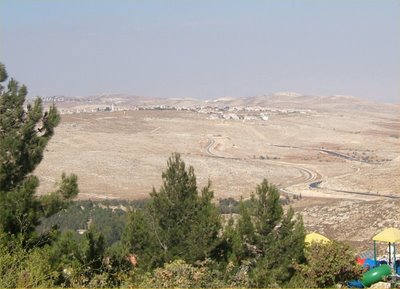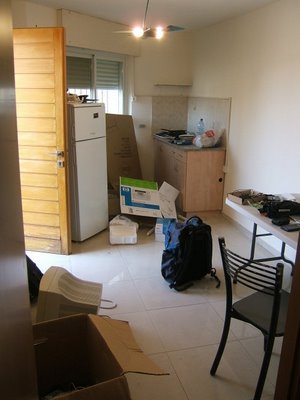My writings on the Nation, Torah, and Land of Israel. To see my artwork, please visit Painting Israel.
Friday, September 29, 2006
Heading Down South
Heading down to my old diggs, Be'er Sheva, the city most often mentioned in the Book of Bereishit (Genesis.) I have lots of friends and my old bicycle waiting for me. But I have to move fast, because the bike needs repairs, the bike shop closes at 2PM today, it takes half an hour to get to the bus station, and another two hours to get to Be'er Sheva, and it's already 10:15 AM.
And did I mention that my fridge never showed up, so I have to go to the mall and pick a fight with the salesman? And the work is still pouring in? And I don't know where I'll be for Yom Kippur? And.... aaaaaaugh!
Come to think of it, why am I sitting here writing this at all?
Shabbat Shalom Planet Earth from Planet Israel!
Wednesday, September 27, 2006
Photos from the Pisgah
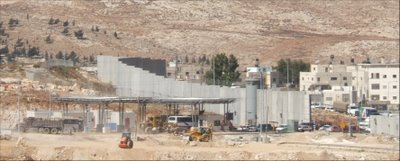

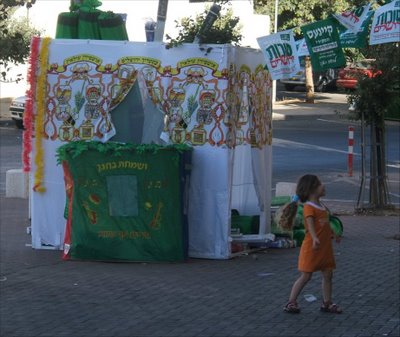 Succot is coming. This is at the store on Meir Gershon Street. Notice the little "kid's sukkah," and the larger one, "Now with Windows!"
Succot is coming. This is at the store on Meir Gershon Street. Notice the little "kid's sukkah," and the larger one, "Now with Windows!" Kanyon Hapisgah (The Pisgah Mall) Notice how dead it is at mid day. It's a nice place but there isn't much to buy there.
Outside the Kanyon.
Ethiopian immigrant. Some day when my Hebrew is better I'll ask him about the staff.
Graffiti on a Transformer enclosure. Okay, it's in Talpiot, not Pisgat Ze'ev, but it's cool so I put it here.
 Miscellaneous Buildings
Miscellaneous BuildingsTuesday, September 26, 2006
The Wall
"Yeah, it's really great. That wall there," he tells me with obvious sarcasm, thumbing towards mile after mile of precast concrete panels stood on end. "It's stopped all terrorism. It's going to stop all the Katyusha rockets too."
It certainly spoils the biblical view. One tries to imagine Abraham or Isaac walking across the landscape with their herds of sheep, and it's inconceivable today. How did they get past the anti-vehicle ditch and the motion-sensors?
There was no wall in 2002, the last time I was in Israel. During those dark days of the Intifada, on Shabbat when everyone else was asleep, I would hike through archaeological sites, stroll through the center of town, and come down to what was then the new housing construction sites at the bottom of town, not realizing at the time that I would be living in one of them today. I remember looking across the small valley separating us from the nearby Arab village of Hizma, thinking, "My God, they can just walk over here in five minutes." But actually building a wall was far too politically sensitive at the time because, regardless of the diplomatic double-speak about "security purposes only," everyone knew that whatever ends up on the "wrong" side of the wall will be next on the chopping block. This sparked hostility from both the left, who want to give away everything, to the right, who would surrender nothing. And never mind that actually building such a massive engineering undertaking seemed as realistic as building an elevator to the moon. But one or two suicide bombings a day for what seemed like an endless string of weeks had a way of ending the public debate and motivating the government in a way no think tank position paper ever could. The first sections of the barrier were actually erected by farmers up north who had had it with the constant attacks and marauders passing through their fields. The government later picked up the idea and started the serious building project.
Long before the actual building of the fence began, the psychology of fortification was already established. During the first Intifadah, in the late 1980's, an exhausted Zionist movement, soon to transform into the new Post-Zionist movement of the 90's, began avoiding the enforcement of certain critical laws. First, the Palestinian flag, which had been banned alongside the Nazi flag, began appearing in public. Then, people who threw stones at passing vehicles with murderous intent were no longer prosecuted. In response, those living in the settlements welded rock-proof steel screens to protect their windows.
"That's when we lost everything," one settler friend tells me, "when we put the screens on instead of catching the stone throwers."
Soon, law enforcement turned a blind eye to another law, the one forbidding talks or negotiations with a terrorist entity, and the entire situation Israel faces today was born.
Watching dump trucks and bulldozers cart dirt around to prepare the next section for concrete panels, I ask Steven, "When was it built?".
"Most of it has been built over the last year. It's like we just woke up and there it was."
The next day, Galila volunteers to give me a ride out to Rami Levi, a discount grocery store in the Sha'ar Binyamin Industrial Area. On the other side of the wall. Her eyes widen as we pass through the Hizma security checkpoint. "None of this was here when I left for Montreal two months ago."
What used to be chain link fences, and an army jeep or two, and a couple of soldiers checking identity cards has now been poured in concrete. At this break in the twenty-foot tall concrete wall now stands a four-lane plaza with drive-through booths. Soldiers sit behind air-conditioned glass enclosures, waving some cars through, stopping others for searches. But the wall and checkpoint don't generate as much despair as the four Israeli flags fluttering in the plaza over the waiting cars.
"It's like this is the new border."
We're on the Ramallah bypass road, one of a series of roads built by the government to allow drivers to avoid passing through densely populated Arab areas. These bypass roads are often referred to by enlightened publications such as the New York Times or the International Herald Tribune as "Jews-only" roads to smear Israel as an apartheid state, in spite of the fact that three out of every four cars on the road is Arab. Fifty feet to the left of the road is the security barrier, a barbed wire fence wriggling across the desert, hugging the road. Fifty feet to the right is the first row of houses in the Arab village of Hizma.
"Rafi called me a few months ago when he was driving out here to tell me about this fence. They built this whole fence," she says, pointing out to the line of barbed wire reaching over the hilltops, "without a word in the news. Nobody told us anything."
The whole landscape has the feeling of a world gone seriously awry. An offramp from the bypass road connects to a freeway underpass, leading who knows where. The offramp is empty, the underpass filled with boulders and dirt mounds. No explanation. Continuing on our way, we glide up to an electronic gate which slides open as we are waved through, and find a spot close to the entrance. Guards, iron gates, twenty-foot steel fences. This grocery store and furniture outlet could easily be mistaken for a prison.
"How long has it been since I was here last?" Galila asks rhetorically, "Three months? I don't remember any of these fences."
Shopping cart in tow I head for the entrance, met by the usual security guard with her usual metal detector asking the usual question, "Gun?"
"No."
"What?" An unusual reaction. She does a double take. "Are you sure you don't have a gun?"
And that's what it's coming down to, as areas on the Israel side of the wall become more civilized, the other side becomes wilder.
The car loaded with vegetables and melting ice cream, we pass back through the Hizma checkpoint without delay. It feels good, very good, to be on the "right" side of the wall. But is the wall really good? Ask any local and they'll tell you, in no uncertain terms, that the very idea of building the great wall of Israel is beyond insane, it's an act of surrender.
It is, however, important to remember that Pisgat Ze'ev is a right-wing stronghold within the conservative fortress of Jerusalem. Driving over the bridge on route 1 into Pisgat Ze'ev, anyone can peer over the barrier to see for themselves the huge sections of empty Land of Israel, and the settlements bustling with tens of thousands of Jews, which are being placed out of reach, in territory now psychologically classified as "hostile" by virtue of its being on the "wrong" side of the wall. And anyone who can sense the proximity of the hostile Arab villages beyond the wall, and thus under looser Israeli control, to the nation's capital in Jerusalem is more than a little apprehensive.
Meanwhile, the wall is looking pretty good from the distance of Tel Aviv. Along the coast, where Israel's decision makers live, cities like Holon, Rishon L'Tziyon, and Hadera have seen major benefits. The most obvious is the virtual disappearance of the suicide bombers. Hamas' and Fatach's claim of "deciding" that suicide bombings are not in their best interest notwithstanding, the wall, combined with the hunting down and killing of their leadership and the military re-occupation of areas previously abandoned during the negotiations of the 90's, has had a major effect on reducing terrorism to tolerable levels. In 2002, suicide bombers struck these areas at least twice a week, leaving scores of innocent victims murdered or maimed every time. Now the bombings have been reduced to about once every six months, if that, with much weaker effects. And that's not to mention the steep reduction in car theft, burglaries, and muggings committed by criminals who used to flee back over the invisible border to find protection under the Palestinian Authority.
The current government was elected on the platform of destroying all Jewish life on the other side of the barrier. According to this scheme, Israel would then turn a blind eye as the Palestinian Authority, now under the command of Hamas, carted off the land on the other side to create their new Islamic Kingdom. This would turn the barrier into a de-facto border with the new Palestinian state that everyone in the world except the Palestinians is demanding. The existence of a Palestinian state would then absolve Israel of responsibility for the health care, education, sanitation, and civil rights of the Arabs, who would have to turn to their own state, and Israel would no longer be an outcast in the international community. Sure, it would cost a quarter of the country's land mass, but how many government ministers or their children live out there anyway?
Israelis, at least those who make the decisions here, are constantly convincing themselves that this is a national conflict, with one nation, called the "Palestinians," who are fighting an independence war against the other nation, called "Israelis." This is psychologically comforting to many as it makes the solution clear: just give them what we think they want; land and power. But the recent war with Lebanon has caused a re-think, not of building the wall, which continues at a furious pace, but about the goals of Israel's enemies. It was a war fought by a non-state, Hezbollah, on behalf of a group of people who adamantly refuse to build a state, the Palestinians. The rocket bombardment from Lebanon didn't manage to pop the Tel Aviv "bubble," they only reached as far south as Hadera. But now, with a hostile border not ninety but nine miles away, it's hard to see how Tel Aviv can avoid being hit by one of the Katyusha rockets Hamas is promising to fire. As a result of the war, plans to destroy the Jewish communities outside the wall's embrace have been abandoned for the time being. As more twisted razor wire and concrete fortifications spring up by the minute, nobody knows where this ship is headed, or who is at the helm.
Monday, September 25, 2006
Shanah Tovah
Friday night, I went to Tzvi's house (his wife's name escapes me.) He is from Miami, his wife is from Iraq. He had one son at home, one is in yeshivah, and his oldest son lives in Berkeley (20 minutes from Walnut Creek.) For the first night of Rosh Hashannah, Ashkenazim like me just eat apples and honey and call it a wrap, but they followed the Sephardi tradition of taking a plate loaded with different fruits and foods, and saying different blessings over each for a successful the new year. I.e., we eat a fish's head and say that, "We should be as the head and not the tail."
Saturday morning I woke up at 5:20AM to daven Netz, the earliest time it's possible to say the morning prayers. Being Shabbat, there was no shofar blowing so we were finished at 9:30 AM. Steven (my American dentist friend) invited me over for kiddush and breakfast. He, his sons, and I went through some Mishnayot and learned about the origins of the two-day yom tov, or at least we learned as much as we could with his seven rambunctious kids squirming in their chairs.
At 11:30, Steven's chevrutah (study partner) came over and I headed downhill to Moshe and Nogah Cohen, friends of my cousin Galila. I tried to follow the conversation, as it was all in Hebrew, and I was at least partially successful. They both immigrated to Israel from Iran twenty years ago, so we ended up talking about their own immigrant experiences, seeing what was the same and what was different.
At 1:30 I went to shul for minchah (afternoon prayers) but realizing I had arrived late, I decided to catch the next one at 6:30, so I went to the washroom. When I came out, everybody was gone, and I was locked in the shul! Unfortunately, most of the windows were protected with iron bars, but I was able to find one unprotected window after half an hour of searching, and I crawled out through that. I spent Saturday night at my cousin Rafi's father's house.
On Sunday I met the Samuels', who had invited me over a week ago without ever having met me. He's from Toronto, she's from London. Almost all of the English speakers have some connection to me since Galila teaches high-level English for at the local school. I ate, played with their kids, slept, and generally hung around their house for something like seven hours until the end of the holiday.
Today, Monday, is a fast day, so last night I decided to load up on water so as not to be thirsty. And here we see the perils of living without a fridge. I didn't remember at the time, but I had opened the liter of water I had been drinking before the holiday, almost 36 hours ago. I guess the water had spoiled because I became violently ill and have been spending the last 15 hours or so rotating between sleeping, trying to sit up and do some work and blogging, exploding from the inside for a while, falling back a sleep again, getting up... well, you know the picture. Fortunately I think I've gotten through the worst of it, but I'm still feeling a bit foul. At least I'm not in the least bit tempted to break the fast! And I did purchase a fridge on Friday, at long last, so it should be arriving some time this week. Until then, I'm just going to have to be more careful.
Thursday, September 21, 2006
Photos from Jerusalem
Positive-thinking graffiti on Hillel St.
 A Pro-Israel Demonstration of Christians in Zion Square
A Pro-Israel Demonstration of Christians in Zion Square
 More of the Christian Zionists
More of the Christian Zionists
Bustling Jaffa St. as seen from a bus window
 Jaffa St. Next to the central post office
Jaffa St. Next to the central post office
 The Kotel (Western Wall,) new with polished floors, great lighting, and air conditioning!
The Kotel (Western Wall,) new with polished floors, great lighting, and air conditioning!
 The outdoor section of the Kotel (Western Wall)
The outdoor section of the Kotel (Western Wall)Wednesday, September 20, 2006
Life in the Neighborhood
I do a quick mental calculation. Shchem is north of the city. The road we were coming in on is in the north. It's unlikely that there will be problems going to the south to Talpiot. If I try to catch a taxi back to Pisgat Ze'ev, I won't be able to get a ride, as the drivers know that they won't be able to get back into the city.
The doors hiss open and the driver punches my bus card. Driving through the city, the scene looks the same as any other day, but feels different. The crowd on the bus is more subdued. Or perhaps it only seems that way. My eye is on everyone in that bus. I'm not edgy or nervous, just aware. The phone buzzes again. The associated press is doing a story on telecommuting and wants to interview me. No problem, just call. Strange patches of everyday life that would come and go in an instant now leave stains on my memory. The red shirt that the woman sitting in front of me is wearing. The crooked nose of the crouched old man two seats down the aisle. The flower pattern on the hijab of the Arab woman at the front of the bus. The crinkling of her bag. Carrying God knows what. To hell with it. I need shelves.
"Don't worry, I know I made the right turn because you're smiling. You would be yelling at me if I didn't."
Tuesday, September 19, 2006
One Month in Israel
First off, now that I have an internet connection, I have finally been able to upload some photos.
This week marks the completion of my first month in Israel. I remember the day I landed as if it were... well, only a month ago. The exhillaration of landing was mixed with worries. As the airport taxi hauled its cargo of groggy olim to their new homes, I looked over the dry, dusty landscape, the pains of jetlag banging in my head, and hoped I had done the right thing coming here.
One month later, despite the various obstacles I have encountered so far, I must say that every day I am more happy that I made it here. Life in the land is sharper, more real. The air is thicker, people's personalities are stronger, and the news, well, it's always newsworthy. It's taken a lot of work, but now I'm sitting here in my own apartment, doing my job, making new friends and getting to know my neighborhood.
I remember the last time I tried to live here, as a student at Ben Gurion University in 2000. At the time, I was studying in a graduate program taught in a language I didn't speak, learning a subject in which I had no experience. I remember the exhaustion of living in a new culture, with a new language. I would sit in my apartment for hours and look out through the window watching construction workers doing their physically exhausting labor, and I was so jealous.
"Imagine," I thought, "fulfilling it must be to have so simple a task in front of you, and to know how to do it."
It took enormous effort just to step outside into that strange, loud, Hebrew world. I remember feeling like a baby channeled into the body of a 22 year old, not being able to ask for so much as a can of olives at the grocery store. I was also under incredible financial strain, and was at the point where I was taking courtesy ketchup from Burger King to season my boiled potato dinner because it was all I could afford. I was sick from the bacteria in the water, and I was far from family.
I came expecting a repeat of this experience, and geared myself up for the full onslaught. I keep waiting for the 20-ton anvil to fall on my head, but so far, everything has moved very smoothly. I'm healthy, my language skills are good enough and Israelis are friendly enough for me to be able to do everything I need to do, and my savings from America are enough to keep me from starving. And if I can manage to hold onto my job, well then, things are really looking up.
So far the most difficult issue to deal with in my aliyah hasn't been the usual wars, famine, and pestilence you see coming out of the region on television. The greatest single obstacle has been the tendancy of life to simply overwhelm and devour you here.
My friend Sasha, who I met in Walnut Creek, who came out from his settlement in Elon Moreh to take me out for a tour of the Ethiopian section of Jerusalem, explained it to me.
"You know, it's such a small country, it doesn't make sense. You can get from anywhere to anywhere in about half an hour. But for some reason there is simply no time for anything."
Most Americans are used to having a huge block of time from 5PM to 10PM of liesure time. This is simply unheard of here. One reason for this is the size of peoples' families. If you have four kids, a realatively modest family size for my neighborhood, watching Law and Order every night takes a back seat. All these families mean there's always a brit (circumsition), bar mitzvah, or wedding to go to. But it's also the attitudes people hold towards schedules, rules, and the general order of life. Everything in this country, from its legal system, which is based on a hodgepodge combination of the British, Turkish, and Jewish systems as well as dictates from the high court, down to the buildings, which may or may not have had permits when built, was thrown together from what was found laying around, patched up, and, through arrangement and haggling, fixed up enough to get by. This is also reflected in people's lifestyles, in which the concept of "tomorrow" is simply not on peoples' radar. I haven't yet heard the expression, "I have to get up early tomorrow so I'm going to sleep now."
Receiving Sasha's tour of downtown Jerusalem, we are interrupted by a cel phone call.
"Ephraim, I'm sorry, I have to go now. I was supposed to meet these book dealers at four."
I look at my watch, which reads two.
"They showed up now," he continues, "at two. That's how it is in Israel. If they say four, they might mean two, or they might mean six, but they never mean four."
Still, this casual attitude towards rules, schedules, and all the underpinnings of western civilization, has something to be said for it. The Jews of Israel are outnumbered one hundred to one by our enemies. Anybody who sat down and did a serious accounting would immediately throw up his hands in bewilderement. How could such a country possibly exist in the first place? But here it is, because nobody read the rulebook, the one that says that countries surrounded by enemies don't survive.
When I had finally had enough of Israeli life four years ago and decided to head back to America, I stored boxes of my possessions; fans, dishes, pots and pans, blankets, etc. with my cousin Uri all the way down in Moshav Bnei Darom, two and a half hours south of Jerusalem. When he heard I was back in town, he drove all the way out the next morning to deliver the boxes, and spent two hours just talking to me, trying to make up all the lost time. So who'se system is really the better one?
Sunday, September 17, 2006
Beutiful Pisgat Ze'ev
Sunset over Pisgat Ze'ev Mizrach (East Pisgat Ze'ev) taken from the Maccabi building. To the left (North) in the midground is the Arab village of Hizma. This photo is looking towards Jordan. On a clear day you can see straight over the Jordan valley.

This picture is taken from a lookout point (and the site of an ancient Canaanite village) in Pisgat Ze'ev Merkaz (Center) looking towards Pisgat Ze'ev Mizrach (East, where I live), the security barrier, and the Arab village of Anata. I live in the clump of houses to the far left.
A photo taken of Pisgat Ze'ev Mizrach (East) taken from the side of the road at Pisgat Ze'ev Merkaz (center.) As you can see, there are large open spaces between each neighborhood which are gradually being filled in. This was taken on the Ramallah bypass road, which leads to many of the more outlying communities.
To take this photo, all I had to do was turn around from the previous photo. The town is full of roundabouts like this. There are very few traffic lights, and there is always room for parking.
Another photo taken from the archaeological site in Pisgat Ze'ev Merkaz (center), this time looking North East. In the foreground are some planted trees. More planted trees in the background show the Neve Ya'akov "forest." The snaking road to the left is the security barrier. The snaking road to the right is the Ramallah bypass road. The village in the midground is the Jewish settlement of Adam. In the background are various Arab and Jewish settlements.
Saturday, September 16, 2006
Three Days of Non-Stop Movement
Thursday:
The technician from HOT, my internet connection, was scheduled to come by, "Sometime between Noon and 10 PM" they told me (thanks a lot.) Given my experience with the Bezek guy showing up 3 hours early, I decided to stay put until they arrived. While waiting, I began unpacking my things and scrubbing my walls, kitchen, and shower, and I got the place looking pretty nice. It's unbelievable how much stuff I've already got here, between what I brought, what I've been given, and what I've found in the street. I have my folding table and second-hand chair already, so I was able to set up my computer. The HOT technician showed up at 2:30 PM (not bad!) and had my internet connection up and running in minutes. I tried to plug in my vonage router and get my phone up and running, but no dice. I was dreading calling technical support to get it running, since they're all Indian. I had to call long distance on my cellular phone using my credit card. After about two hours, we almost had the system working. Ramon and I (these Indian guys are getting more and more creative with their American names) were scratching our heads until finally we figured out that my phone cord was dead, so we replaced it and now my Vonage connection works. In fact, it works BEAUTIFULLY! I have the same phone number I had when I was in the states, and the connection is far clearer than using an Israeli land line. I immediately called my boss and all of my project managers back in California and told them that they can now call me before noon. They were all impressed with the quality too.
This is a MAJOR weight off my chest, to finally have my virtual office up and running smoothly.
Just as I got the line up and running, the cops came over and took my fridge. Sagi, the ex-tenant here, is a cop, so he sent some of his head-shaved tough-guy buddies over to collect it. I brought what I could up to Rafi and Galila's house and stored it in their fridge, but I think I'm going to lose my tomatoes and cucumbers pretty soon.
Friday:
I meant to spend Friday working. I really did. Instead, I had to run to the post office. Avi the landlord was coming out of the house just as I did.
"Hey, Ephraim, did you get the internet running?" he asked me.
"Yup. And the phone is clear as a bell."
He scratched his head, trying to translate the metaphor.
"Well, do you need anything else?"
"Um... do you have an ironing board I could borrow for about twenty minutes this afternoon? I need to iron my clothes for shabbat."
"No problem. Just ask when you're ready," he told me, "And do you need a ride anywhere?"
I hopped in and he took me up to the top of the Pisgah, ran to the post office, then hiked up Moshe Dayan street (the main street which connects Pisgat Ze'ev North, South, East, West, and Center) buying various items on discount. Picked up a mop, ice trays (I WILL have a fridge again some day,) bowls and plates, a rug, and a two-burner electric range. Hauled it all back to my place, grabbed my checkbook, and caught the six downtown. Jumped off at Mea Shearim, the ultra-super-orthodox stronghold in the city, where I found second hand appliance stores, and began pricing refridgerators and beds. The prices were surprisingly high, so I walked away disappointed, without buying anything, thinking I had just wasted two hours. It was very frustrating, because I was on such a roll. Every time I had come to the bus stop Friday, the bus had pulled right up within 45 seconds (usually a 20 minute wait,) and I had accomplished so much so far.
"Well," I figured, "as long as I'm in the city, I could walk to the Kotel (Western Wall) and daven Minchah (afternoon prayers.)" At least then I could justify my time, as davening at the Kotel is never a waste. I found a minyan and pleaded with the one on high to release our captive soldiers in Gaza and Lebanon/Iran, asked for some shidduch guidance, and threw in a request for some furniture.
On the way home I remembered that Steven (the American) had told me about some extra shelves he had. I called him from my cel phone and he told me where to get off the bus in front of his house. He showed them to me, I graciously accepted, and we threw them in the back of my car. The shelves will require some drilling of holes in the walls, which will require the landlords' permission, but I think it will be okay since there are already plenty of holes.
As I was laying the boards out on the floor, Ehud, my landlords' son, stood in the doorway holding an ironing board.
"My father said you needed to borrow an ironing board. You can use this one for as long as you want, until you move out."
"Great!"
"Also, you should know that I'm going to yeshivah in Atzmonah."
My mind drew a blank. Atzmonah was one of the towns destroyed in the disengagement last summer. Then I remembered, most of the towns, communities, and yeshivahs are rebuilding themselves from the ground up in the Negev desert.
"My yeshivah," he continued, "is replacing everything, so we have a lot of stuff. Microwaves, blankets, beds, everything. If you let me know, I'll see if we can donate to you some of the things we are replacing. Just tell me what you want."
We went through my list. A bed, washing machine, refridgerator, shelves, tables, kumkum (a little water heater), fans, everything.
"I'll see what I can do. We'll talk on Sunday."
So there's some good news.
Shabbat:
This is my first Shabbat in my own place, without Rafi and Galila, who had gone to Hertzeliyah (near Tel Aviv,) as Rafi, aside from being my cousin's husband, also happens to be a famous chazzan (singer at the synagogue) and he had scheduled a shabbat there.
Shabbat started at 6:30 PM. I went to Pisgat Moriah, the Ashkenazi shul with all the Americans for Ma'ariv (evening prayers,) where Rabbi Levine, the local Rabbi, had invited me over for dinner afterwards. The entire conversation over dinner was in Hebrew, but I was actually able to follow some of it, and met some new, friendly faces. I left at about ten, but wasn't tired. I was walking by Rafi's father's house (his father is the Rabbi at one of the local sephardi shuls) and heard people talking inside, so I strolled in and walked right into a Torah class. I was invited to sit down and stay, to enjoy various forms of alchohol and ice cream while listening to the lesson, which I did. I got home around 11:30 PM and crashed.
Shabbat morning, I raced over to Rafi's father's shul, which, as I mentioned, is very sephardi. I was able to use my Chabad siddur (prayer book) and follow along just fine. Rafi's brother Shmulik just had a baby girl, so I wanted to be there for the kiddush. Afterwards, I ran up to Pisgat Moriah, where I intercepted Elie, a local Anglo I had met through Steven, who had invited me over to his place for lunch. We had another local Anglo with us, who also happens to be a producer for Arutz 7 (the famous right-wing contraband settler radio station.) More friendly faces, and this time the conversation was in English. I went home and crashed again, but got up in time for Seudah Shlishit (third meal), again with Rafi's father. I davened Minchah at a local Moroccan shul, then hiked all the way back up to Pisgat Moriah for another Torah class with Rabbi Levine. After Ma'ariv I solicited an invitation from Rabbi Levine to come over for Havdallah (the ceremony marking the conclusion of Shabbat.) Afterwards, while hiking home, I found a laundry bag and a laundry drying rack at the side of the road and hauled them home.
Which brings me to now. Whew! And now, back to work.
Thursday, September 14, 2006
More Apartment Photos
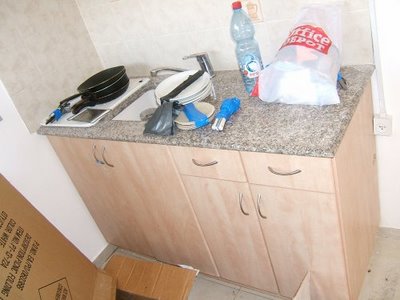 Here's a shot of my kitchen. Cousin Uri from Moshav Bnei Darom (down near Ashdod) drove up with three boxes loaded with stuff that I left with him four years ago. He tells me it's a miracle the stuff wasn't thrown out, as his storage area is just a station on the way to the garbage. I had some pots and pans which I had marked well, and some silverware that is entirely metal and so can be kashered, but unfortunately my dishes were ceramic and unmarked, so I don't know if they're meat or dairy, so I'll probably have to toss them. They're pretty nasty anyway.
Here's a shot of my kitchen. Cousin Uri from Moshav Bnei Darom (down near Ashdod) drove up with three boxes loaded with stuff that I left with him four years ago. He tells me it's a miracle the stuff wasn't thrown out, as his storage area is just a station on the way to the garbage. I had some pots and pans which I had marked well, and some silverware that is entirely metal and so can be kashered, but unfortunately my dishes were ceramic and unmarked, so I don't know if they're meat or dairy, so I'll probably have to toss them. They're pretty nasty anyway.THe apartment itself is kind of odd. It's very clean and new. Notice the granite countertop and polished jerusalem stone floors. But then there are all of these junky plastic shelves held by angle irons. I could really make it a nice place, but I don't want to go overboard moneywise.
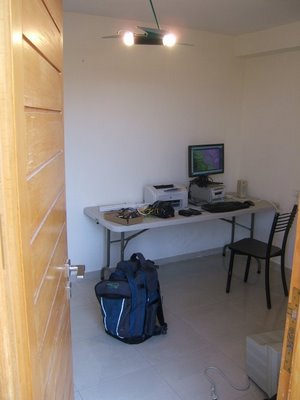 I got my folding table and found a chair next to the dumpster, so I have my little work station already set up and going. First comes work, then comes furniture.
I got my folding table and found a chair next to the dumpster, so I have my little work station already set up and going. First comes work, then comes furniture.
A view from the hallway.
That's about it for the apartment!
I have Internet!

 The fridge Sagi left me (I'm still waiting for him to pick it up.)
The fridge Sagi left me (I'm still waiting for him to pick it up.)
 My bedroom window opens to a tiny little space. I'm keeping my suitcases there for now, hoping to eventually clean it out and make it pretty. My bedroom is actually the cheder bitachon (security room/shelter). notice the gasket seal on the window, and the sliding steel shield.
My bedroom window opens to a tiny little space. I'm keeping my suitcases there for now, hoping to eventually clean it out and make it pretty. My bedroom is actually the cheder bitachon (security room/shelter). notice the gasket seal on the window, and the sliding steel shield.
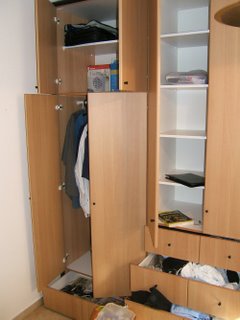 The built-in closet.
The built-in closet.
My Room
More to come!
Wednesday, September 13, 2006
On the Dating Scene
Often times, it's taken a bit too far, along the lines of, "Wait a minute, you mean you have ears? OHMYGODOHMYGODOHMYGOD!!! She has ears too! It's a shidduch!"
Tuesday, September 12, 2006
Pulling it Together
I'm not sleeping in the hide-a-bed in cousin Rafi's office any more. I'm finally sleeping on my very own air bed in my very own room. It's the usual air-bed experience, fall asleep on the matress, wake up on the floor (after the matress deflated.)
I have my own little office set up in my salon, and have unpacked some kitchen appliances. And I found a microwave for 195 shekels today and grabbed it! Not going to find a deal like that anywhere else in this country.
My internet still isn't up and running, so I come up here to my cousins' place from 6PM to 10PM to use the internet, update the blog, check my email, and downolad all the files I'm going to need for work. I then go to my apartment and spend the day working with all the data I downloaded.
Tomorrow cousin Galila is taking me shopping to buy a stovetop and get some groceries.
And tomorrow, I have my very first shidduch date since I landed. This is where the fun starts! Wish me luck.
Monday, September 11, 2006
Move-IN Day
I had my computer up and running within two hours, albeit without internet connectivity. At around 1 I inflated my air mattress and slept off the exhaustion. Now it's almost midnight and I'm at Rafi's desk, using his computer, working.
I'm still having trouble uploading photographs, and now that I live in an apartment without internet connectivity it is difficult for me to post. I hope to keep up the daily posting, and will certainly resume full posting with more pictures once I manage to get my high-speed internet up and running at my new apartment, which should be thursday if everything goes according to plan (which it seldom does.)
Sunday, September 10, 2006
Making the Connection
"Hi, this is Roni from Bezek. I'm at your apartment to install the connection. Where are you?"
They're three hours early.
"I'll be there in five minutes."
"Five minutes. If you're not here I'm leaving."
I sprinted the half mile between the makolet and my new apartment in four minutes, arrived sweat-soaked and panting. I need internet NOW to do my job.
"What? Why did you run?" he asked me, "I would have waited."
We entered the apartment, he looked around, and announced, "No. Impossible. I can't install your connection."
I called my landlord and he pulled up minutes later. After what most people would consider an argument, and Israelis would consider a conversation, we all agreed that it was impossible. There simply wasn't a physical connection between the phone system on the street and the apartment, which makes internet access impossible. The landlord immediately apologized and offered to nullify my contract. No way! We then remembered that Sagi, the previous tenant, had internet, so we went down to take a look. Turns out there is a connection for HOT, Bezek's competitor, to provide internet via cable. Excellent. So we called HOT, registered with them, called Bezek, went through like three layers of the company, and managed to cancel my other account. Problem solved. So now a HOT technician is coming to my apartment on Thursday, I will have fast internet, and I will be able to work from my very own apartment, finally! Though given the amount of struggle it has taken to get this far, I'll believe it when I see it.
In the mean time, my landlord is busy putting a new coat of paint into the apartment and cleaning the floors. I've moved all my stuff into the front yard here at Rafi's house in order to be able to move the stuff into the car and over to my new place just as soon as I can find someone with a car to help me, and I'm still working from Rafi's office and living on his hide-a-bed.
But I'm getting closer.
Thursday, September 07, 2006
A Productive Day
Next, I headed for Ulpan Pisgat Ze'ev. I had heard of the ulpan previously, and have been desparately trying to reach the ulpan director over the last few weeks to sign up. Today I finally got a hold of her by phone and, realizing that she was actually in the office, raced over to sign up. After discussing my situation with her, I eventually learned that the ulpan here is not the sort of intensive, four hours per morning five days a week type of studying that I wanted, but only one day a week, and it lasts a full year. All of the intensive ulpans began last Sunday. At this point I can either try to crash the intensive ulpan and start in a week late, or I can take the laxidazical Pisgat Ze'ev Ulpan, which starts in October after the holidays end. At this point I am inclined to simply take no ulpan at all this semester, focus on getting settled and putting my job and life in order, and then taking an ulpan in January once my situation is more stable. My Hebrew is certainly good enough to get around, if not yet strong enough to successfully order internet service.
Later in the day, I took the number eight bus out to Talpiot and bought a folding table and an inflatable mattress for my apartment. Moshe picked me up, fed me ice cream, took me to Minchah/Ma'ariv, and then took me back home. Tomorrow I want to head into central Jerusalem to look at some second-hand stores and see what kind of appliances I can find for less. But right now, tomorrow is so far away, and I'm so wiped out, that I can hardly even envision anything beyond my pillow.
Wednesday, September 06, 2006
A Rough Day
Setting up my new apartment is proceeding, but I have hit a snag with internet service. From what I learned from American Moshe, in Israel you have to sign up with two companies to receive internet service. The first is Bezek, Israel's phone monopoly, which installs the hard connection for you. They charge 300 shekels for the favor of installing the line before charging a monthly fee of 80 shekels. Then, there's the internet service provider. This has been opened to competition, so there are about five major providers, one of which is also Bezek. You have to sign up with one of them and pay them a monthly fee as well. That way, Bezek picks your right pocket and the internet service provider picks your left pocket, so nobody steps on anybody else's toes.
I've been getting quite tired of having my hand held, between Nefesh B'Nefesh, my cousins, and friends throughout the country insisting on helping me with everything. I decided that this was something I could do on my own for once! So I called Bezek and signed up for an account. Roi, my operator, asked me, "Do you want me to get somebody who speaks English or do you think we can do this in Hebrew Ephraim? Ephraim... wow, that's a special name." I figured I can speak decent Hebrew, so we went through the entire procedure and I signed up for the internet. Problem solved, right?
Well, today I called to order my modem and it was as if nobody had ever heard of me. Rafi happened to be driving down to the Bezek store to pick up a new modem and gave me a ride. When I got there, their computers were on the fritz so they couldn't find my file. I was getting so frustrated that I decided to leave it for the next day and stormed out. Fortunately, the Bezek store happened to be right next to the central bus station where they sell telecards, so I bought one and could at least say that I accomplished something.
Tuesday, September 05, 2006
Meet the Anglos
"Says so on your shirt. Camp Gan Israel Contra Costa. I'm from Los Angeles, moved here four years ago."
"I don't really need Hebrew for much. All four of my kids learned it very fast. It took my oldest daughter two years, but she finally picked it up. She's eighteen now and learning in a settlement uphill from Modi'in."
Monday, September 04, 2006
A Few Pisgat Ze'ev Snapshots
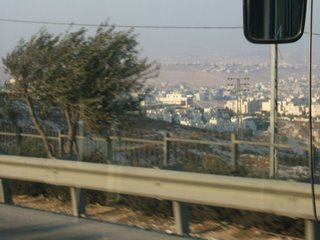
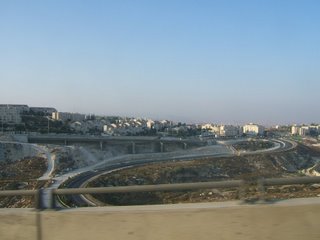 A shot (again from the number 6 bus) of the entrance to Pisgat Ze'ev, taken from the route 1 bridge. The road in the foreground is the old, winding road that used to be the only way to get out here. Ten years ago Pisgat Ze'ev was considered an outlying "way way out there" town. Now it's a suburb. ou can also see here where the final station for the Jerusalem Light Rail is being built. Scheduled completion date: June, 2006. So far they are only about a decede behind schedule.
A shot (again from the number 6 bus) of the entrance to Pisgat Ze'ev, taken from the route 1 bridge. The road in the foreground is the old, winding road that used to be the only way to get out here. Ten years ago Pisgat Ze'ev was considered an outlying "way way out there" town. Now it's a suburb. ou can also see here where the final station for the Jerusalem Light Rail is being built. Scheduled completion date: June, 2006. So far they are only about a decede behind schedule.Settling Update
This morning I woke up early enough to make the non-Chabad Ashkenazi minyan. Met many interesting people, subjects for a future post. I made it back in time for a ride to Talpiot, where I checked out various stores in the mall. Talpiot is in southern Jerusalem, and it more of an industrial area. Even in the holy city of Jerusalem, the "eternal and undivided capital of the Jewish people," the average man on the street still needs to get his muffler changed and a new fridge, and Talpiot is the place to do it. I'm recording prices for appliances and furniture in my Pocket PC so I can do some comparison shopping. Meanwile, I'm mentally recording the locations of all the important stores and what is sold in each, trying to get a mental handle on what the prices should be, and what constitutes a good deal.
We eventually came home and I did something I'd been dreading for weeks now. I called Bezek (the Israeli phone monopoly) to discuss setting up a land line and an internet connection in my soon-to-be apartment. I'm not so much intimidated by the technical details as I am by the Hebrew. There is a tall mental barrier in the mind of any non-native speaker in making a cold call completely in a foreign language. Especially if money is leaving your pocket and you are signing up for a contract. Fortunately, I got a hold of a good operator, who walked me through the process of establishing an internet connection and even gave me his personal Cel Phone number in case I had trouble. Only in Israel.:)
A few hours later, cousin Uri arrived all the way from his farm on Moshav B'nei Darom (yes, it's where the famous Israeli pickles come from,) and he delivered three boxes I had left in their storage container four years ago when I left Israel. The thing is, I don't even remember what I put in there, so for me it's like receiving gifts!
Tonight we celebrated Amichai's birthday (one of cousin Rafi and Galila's sons), so we all went out to Burger King. I haven't been to Burger King in four years, since the only kosher Burger Kings can be found in Israel, and it was a relief to taste the bland, caloric food and know that I haven't been missing anything after all. If I need to eat out, it's back to shwarma for me.
Sunday, September 03, 2006
Next Step: Internet
For planning out my new place, I'm thinking along the lines of starting out with folding chairs and tables, and getting an inflatable air mattress. The rationale being that I have no car, and none of my friends have very big cars, so I won't be able to bring anything in without paying movers and arm and a leg. Past experience has shown that I tend to collect furniture from various donors who are only too happy to get rid of it and help out a young guy just getting started out in life. So I'll just get the portable stuff that can fit into my friend Moshe's Toyota Corolla until I can figure something else out.
In the mean time I'm beginning to research different internet services in Israel, as I need to have a connection up and running when I move in on the tenth. Since I don't have international phones set up yet I'm trying to figure out if international calling cards are available in Israel, as I need to be able to at least call the office from time to time for design issues and coordination.
I'm still getting set up here, but at least I feel I can relax a little bit as I don't have to worry about a place any more.
Saturday, September 02, 2006
Pisgat Ze'ev Pictures
Posting Photos
Here's a view you won't get from Walnut Creek:

For now, I'm keeping all my stuff on Rafi & Gaila's balcony.
Note the giant concrete wall in the background. I'm standing in Pisgat Ze'ev. The Arab village behind me is Anata.
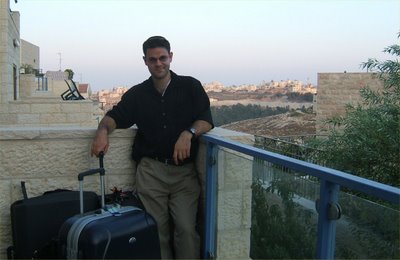
Friday, September 01, 2006
I Have a Place!
At the beginning of the week I set for myself the goal of having an apartment before Shabbat, and, with four hours to spare, besiyah dishmayah (with help from above) I have succeeded! Thanks to Shelly Levine (http://www.tivuchshelly.com/) I was able to get the name and number of the landlord and a description of the only one-bedroom apartment in Pisgat Ze'ev before it hit the papers the next day. I went to the site Wednesday night and meet the landlord and his wife, and seem to have made a good impression. Unfortunately the place was locked at the time, and the tenant had apparently changed the lock, but at least I was able to leave a good first impression. I left my cousins' number and told them to call once they were able to get it open. When they returned the call, cousin Galila picked up the phone and they started chatting. It turned out the landlord's wife was ganennet (kindergarten teacher) for her two sons, which earned me a few more points.
By the time I was able to get out there to see the place, last night, he said he had already shown it to seven people, which is believable since cousin Rafi tells me that thirty people responded to his ad when he tried to rent out an apartment a year ago. But the landlord and his family liked me, I had connections, I had been there first, and I'm shomer shabbat (sabbath observant) as are they, so I got the place.
The next problem was paying the guy. I am still waiting for my checkbook from my new bank account. Fortunately, my bank happens to be one of the few that is open on Fridays (Friday in Israel is like Saturday in America), so I was able to get a cashier's check for the first three months, sign the contract, and that was it. I have to wait until September 10th to move in, and it will probably take me a Shabbat as I have a place.
Next weeks task list will be as follows:
-Begin gathering furniture (the place is completely unfurnished.)
-Begin serious telecommuting work via email
-Research ulpan here in Pisgat Ze'ev
-Have some fun exploring new parts of the city
Of course, the sun is setting in the west, all the stores in Pisgat Ze'ev closed a few hours ago, the last bus is rolling by outside, and Shabbes is coming! So it will have to wait.










